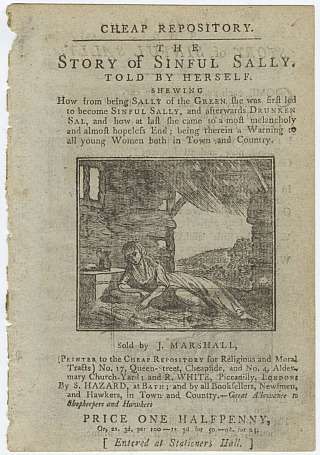What 'Sinful Sally' can teach us about vice in the 18th century

What can "Sinful Sally" teach us about moral attitudes in the 18th century? That's what Jessica Steinberg has come to the McMaster archives to find out.
Steinberg is this year's recipient of the McMaster-ASECS fellowship, a program that supports 18th century studies, and has spent the last month poring over a diverse array of period texts in McMaster's William Ready Division of Archives and Research Collections looking for insights into how immorality and sin were defined and controlled in 18th century London.
"The question of morals and vice is among the most central questions of the 18th century," says Steinberg. "Religion is a really important part of life in this period, it's how people think about themselves, it's how they look at themselves in relation to the world- what is acceptable conduct and what isn't acceptable conduct. There's a lot of moral policing around sexuality, especially women's sexuality, and there are huge concerns that this is going to bring down the nation."
Steinberg , who recently completed her PhD at the University of Ottawa, has been examining this question by looking at a number of period texts from the McMaster archives' renowned 18th century literature collection to see how religious language associated with the seven deadly sins and the ten commandments was used to frame ideas around what she calls, "moral failure."
The texts include religious writings and sermons, magazines and popular works by period authors like Daniel Dafoe as well as Hannah More who wrote the colourfully titled, "The gamester: to which is added, The story of sinful Sally, told by herself," a tale that, according to Steinberg, reveals much about moral attitudes of the period.
"Although sin specifically refers to a violation of God's laws, it was also seen to have an immediate impact on the sinner's soul and on the rest of society," says Steinberg. "In the story of Sinful Sally, we see how an initial transgression leads to a life of sin, crime and ultimately Sally's demise. Once someone committed a transgression, even a seemingly minor offense, like gaming or over drinking, social critics and moralists believed they would inevitably commit more transgressions until they were ultimately caught and punished."
Steinberg, whose research at McMaster will inform revisions to her dissertation and ultimately a journal article, says these texts have helped provide her with additional insights into the nature of Christianity, religious discourse and social order in 18th century England.
Wade Wyckoff, Associate University Librarian, says he's pleased that through the McMaster- ASECS Fellowship, the collection is helping support scholarly research like Steinberg's.
"The collection contains an extensive array of texts and materials that shed light on many aspects of life in the 18th century," says Wyckoff. "It's very gratifying that as this year's McMaster-ASECS fellow, Jessica has been able to make use of these resources to further her work in advancing scholarly understanding of the some of the central social and religious issues of the period."
Provided by McMaster University



















